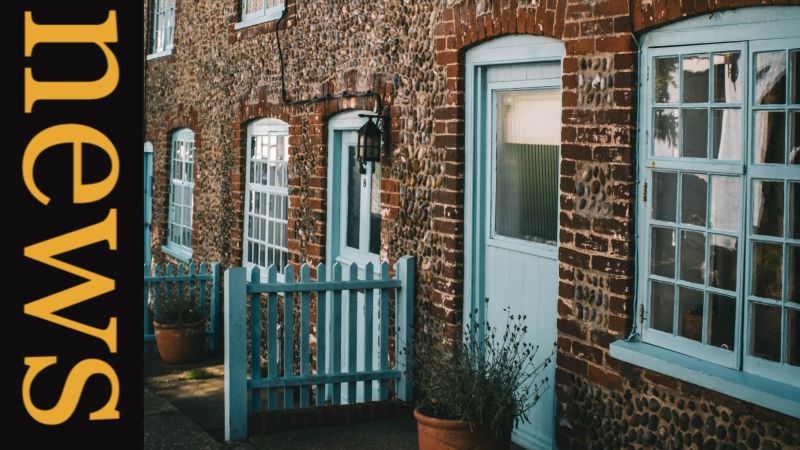Categories
NEWS: No Deposit Mortgage Now Available – Is It Worth It?

A major lender has launched a no deposit mortgage that lets first-time buyers get a 100% LTV mortgage (loan to value).
The minimum deposit is usually 5% for first-time buyers.
So, what makes this mortgage different? Is there a catch? And what will the interest rate be?
Here’s what you need to know:
- First-time buyers only
- You need a track record of paying your rent and bills (for the last 12-18 months)
- Your mortgage repayments can’t be higher than your historic rent payments
- You can borrow up to 4.5x your income
- And up to £600,000
- It’s only available with a 5-year fixed rate mortgage at 5.65% interest
There are also a few other requirements:
- You must be over 21
- You can be eligible with a partner
- New build flats are not eligible
- You must have no missed payments on debt of credit commitments
So, how good is the interest rate?
Carly-Marie Cheeseman
Head of International CeMAP CeRER
In fact, the lender announced that from 18th August 2023, they were cutting their rates across many of their mortgage products, including the 100% deposit mortgage.
Need help? Book a free, no-obligation appointment with a mortgage adviser:
How much can you borrow with a no deposit mortgage?
You can borrow up to £600,000 with a no deposit mortgage.
It’s also capped based on your average monthly rent over the last 6 months.
And it’s capped on your income - you can borrow up to 4.5 times your salary (and you can combine this with your partner’s for joint applications).
So, for example, if your average rent has been £1,000 over the last 6 months, you could borrow roughly just over £185k as long you earn at least £41k per year.
This calculation is also based on a 35-year mortgage term – any shorter, and you might not be able to borrow as much (because your monthly repayments get bigger).
Here are a few more examples (still assuming a 35-year term):

- Rent: £750
- Income: At least £31k pa
- You can borrow: Roughly £140k

- Rent: £1,500
- Income: At least £62k pa
- You can borrow: Roughly £280k
What documents do you need for a no deposit mortgage?
You’ll need to provide:
- 12 months' bank statements with your proof of rent payments
- Or a letter from your letting agent with confirmation (if you pay in cash)
- General mortgage application paperwork such as proof of ID (driver’s license and passport) etc.
Can you get a no deposit mortgage if you’re self-employed?
Yes, you can get a no deposit mortgage if you’re self-employed.
The same criteria apply as above, and you’ll need to provide two full years of accounts to evidence your earnings.
You can still borrow up to 4.5 times your annual income just like an employed applicant.
Are no deposit mortgages a good idea?
Andrew Bailey (Governor of the BoE) has said both lenders and borrowers need to be “very careful” with 100% LTV borrowing.
But are these legitimate concerns?
Andrew Bailey is likely coming from the perspective of: if you take out a 100% LTV mortgage, in 5 years’ time when your deal ends, you may not have repaid enough capital to qualify for a standard remortgage at a lower loan to value.
So, he argues that people get “stuck with mortgages for a long period of time which they can't trade out of”.
This was true during the 2007/08 financial crises.
Some people borrowed up to 125% of the value of their home (which seems incredible nowadays).
When their deal ended, they couldn’t find a lender to remortgage with because of their high LTV, and so were stuck paying their existing lenders’ high standard variable rate (SVR) that they couldn’t necessarily afford.
But in today’s world, there are more regulations in place.
Carly-Marie Cheeseman
Head of International CeMAP CeRER
Watch our video below to learn more about no deposit mortgages:
What are the alternatives to a 0% deposit?
The main alternative to a 0% deposit would be a 5% deposit mortgage.
5% of your property value might be an achievable saving target for you – and if it is, you’ll likely be able to get a bigger mortgage or a lower interest rate for your first home if you can provide it.
Generally speaking, the more deposit you can put down, the cheaper your mortgage will be and the more you can borrow.
At Clifton Private Finance, we work closely with many different lenders that each have their own strengths and specialities.
While this lender does offer a great 0% deposit mortgage product, they may not provide the best interest rate for a 5% deposit FTB mortgage or a remortgage, for example.
That’s why it’s good to use a mortgage broker.
From high street banks and building societies to private banks and specialist lenders, our lending pool is vast.
We can look at your broader financial situation and connect you to the lender with the best deal for you.
We also package your application for you and ensure the process is streamlined and stress-free - right up to you getting the keys to your new place.
For advice on your specific situation, book a free, no-obligation phone consultation below.
FAQs
Can you get a mortgage without putting down a deposit?
Yes, you can! If you’re a first-time buyer, and meet all the criteria detailed above, you can now get a mortgage in the UK with a 0% deposit.
Can you buy a house with a 5% deposit?
If you have a 5% deposit or higher, you can get a mortgage as a first-time buyer.
The more you can put down, the better interest rate you’ll likely get.
You probably won’t be eligible for the 0% mortgage talked about in this article, but there will be more options out there available to you – speaking to a mortgage broker can help narrow them down.
What if you’re no longer renting, but you were recently?
If you’ve moved in with friends and family less than 6 months ago, you may still be eligible for a 0% deposit mortgage if you can still provide 12 months of rental payments in a row.
If it’s been more than 6 months since you moved out, it’s unlikely that you’ll be eligible.
You’ll have to rent again for 12 months or muster up a 5%+ deposit to put down for your new home.
Are new builds included?
Yes, new builds are accepted as long as they’re not new-build flats.
A normal flat is also okay, just not a new-build one.
Can you make overpayments?
Yes, overpayments are allowed for up to 10% of the original balance per year, and you won’t be charged an ERC (early repayment charge).









